Applying Ethical Theory: The Impact of Driverless Trucks in Australia
VerifiedAdded on 2021/06/16
|8
|1769
|20
Report
AI Summary
This report from Charles Sturt University analyzes the ethical implications of driverless trucks in Australia, focusing on their potential impact on jobs within the transport industry. The report examines the issue through the lens of several ethical theories, including utilitarianism, deontology, virtue theory, and contract theory, to evaluate the actions of industry owners and the ethical issues arising from technological advancements. It explores the facts, issues, and the individuals affected, particularly the drivers facing potential job displacement. The analysis considers the ethical implications of these changes and proposes potential solutions, including the need for government intervention and ethical decision-making by industry leaders. The report concludes by emphasizing the importance of considering multiple perspectives and ethical frameworks when making decisions related to technological advancements and their societal impacts.
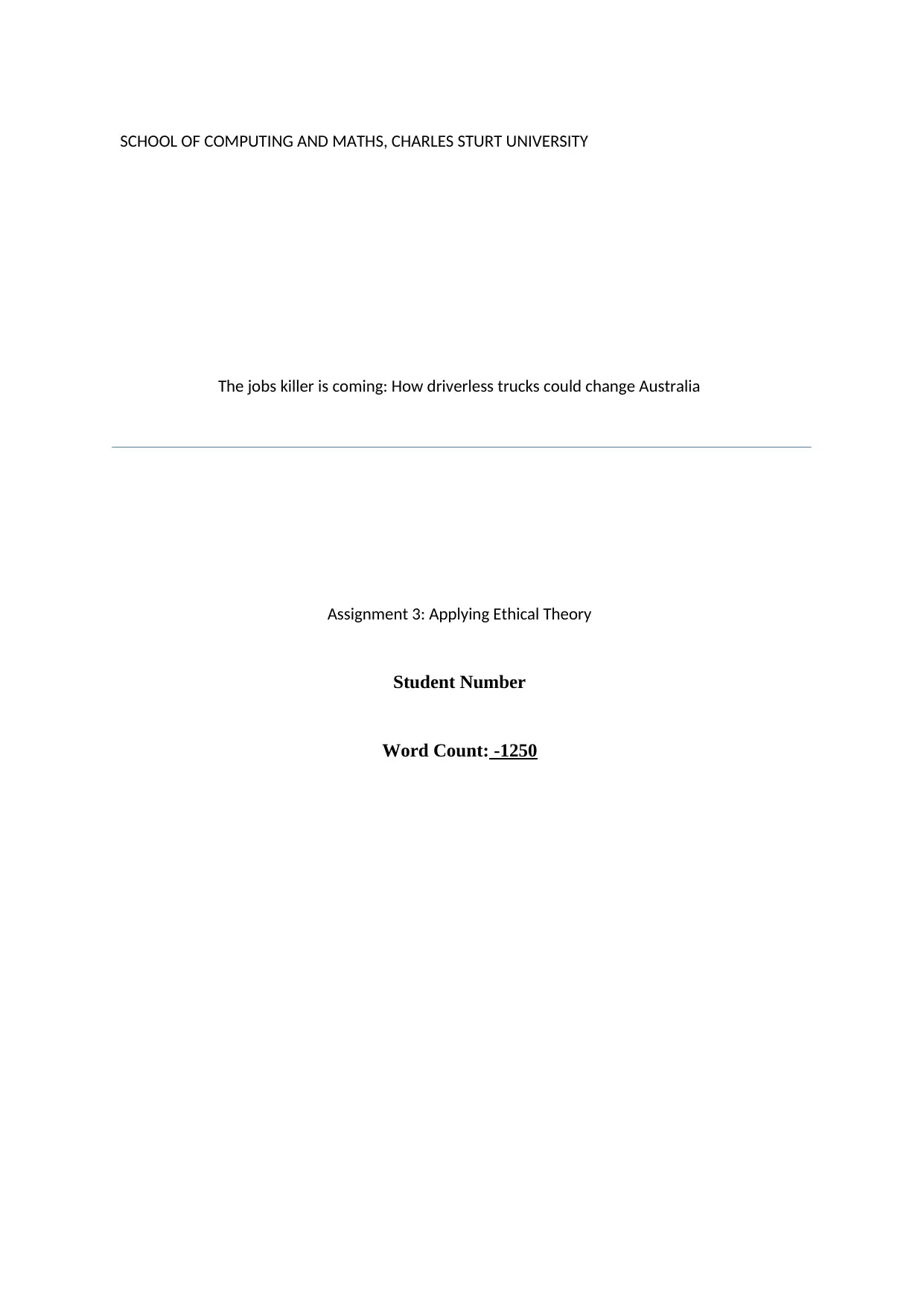
SCHOOL OF COMPUTING AND MATHS, CHARLES STURT UNIVERSITY
The jobs killer is coming: How driverless trucks could change Australia
Assignment 3: Applying Ethical Theory
Student Number
Word Count: -1250
The jobs killer is coming: How driverless trucks could change Australia
Assignment 3: Applying Ethical Theory
Student Number
Word Count: -1250
Paraphrase This Document
Need a fresh take? Get an instant paraphrase of this document with our AI Paraphraser
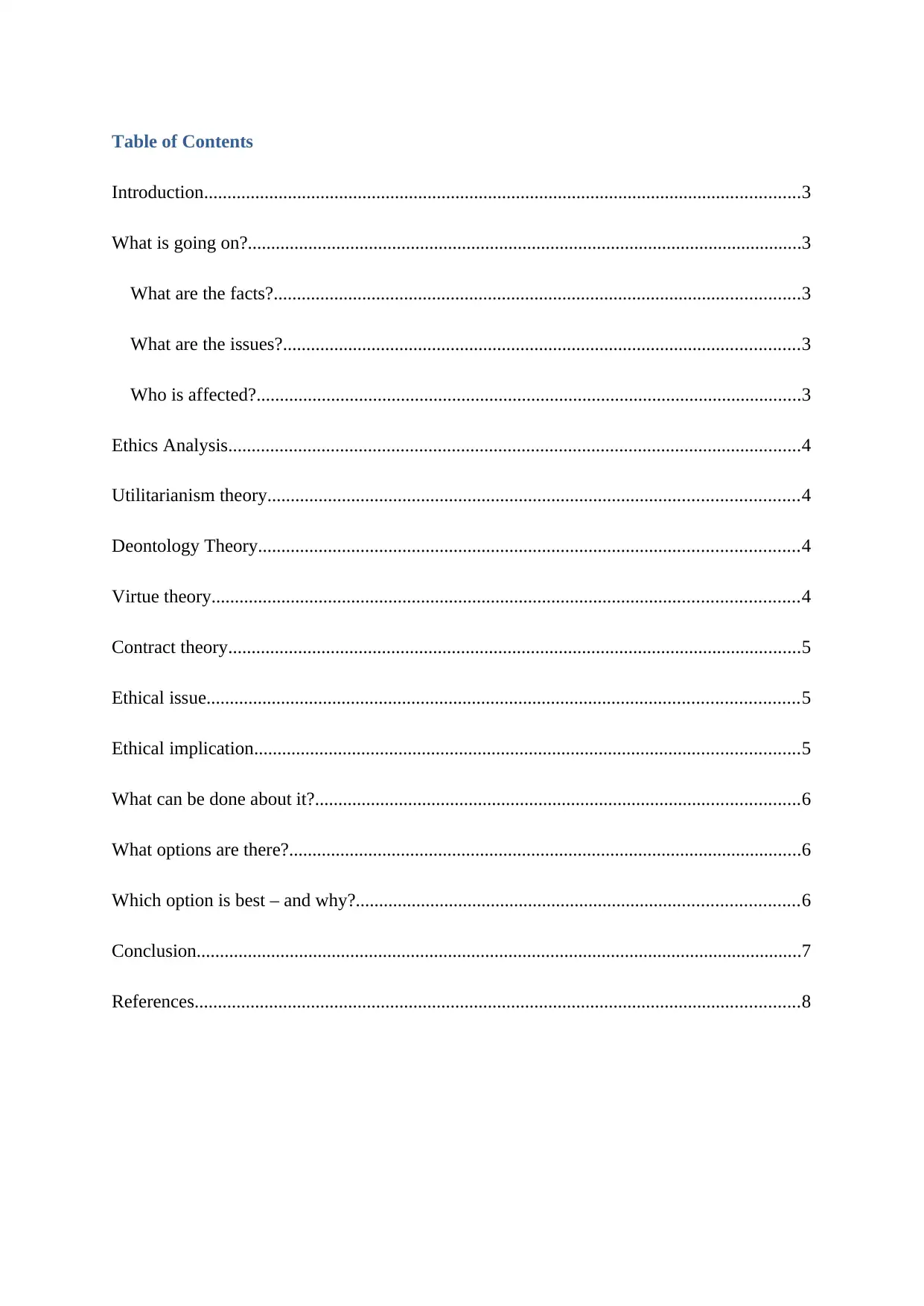
Table of Contents
Introduction................................................................................................................................3
What is going on?.......................................................................................................................3
What are the facts?.................................................................................................................3
What are the issues?...............................................................................................................3
Who is affected?.....................................................................................................................3
Ethics Analysis...........................................................................................................................4
Utilitarianism theory..................................................................................................................4
Deontology Theory....................................................................................................................4
Virtue theory..............................................................................................................................4
Contract theory...........................................................................................................................5
Ethical issue...............................................................................................................................5
Ethical implication.....................................................................................................................5
What can be done about it?........................................................................................................6
What options are there?..............................................................................................................6
Which option is best – and why?...............................................................................................6
Conclusion..................................................................................................................................7
References..................................................................................................................................8
Introduction................................................................................................................................3
What is going on?.......................................................................................................................3
What are the facts?.................................................................................................................3
What are the issues?...............................................................................................................3
Who is affected?.....................................................................................................................3
Ethics Analysis...........................................................................................................................4
Utilitarianism theory..................................................................................................................4
Deontology Theory....................................................................................................................4
Virtue theory..............................................................................................................................4
Contract theory...........................................................................................................................5
Ethical issue...............................................................................................................................5
Ethical implication.....................................................................................................................5
What can be done about it?........................................................................................................6
What options are there?..............................................................................................................6
Which option is best – and why?...............................................................................................6
Conclusion..................................................................................................................................7
References..................................................................................................................................8
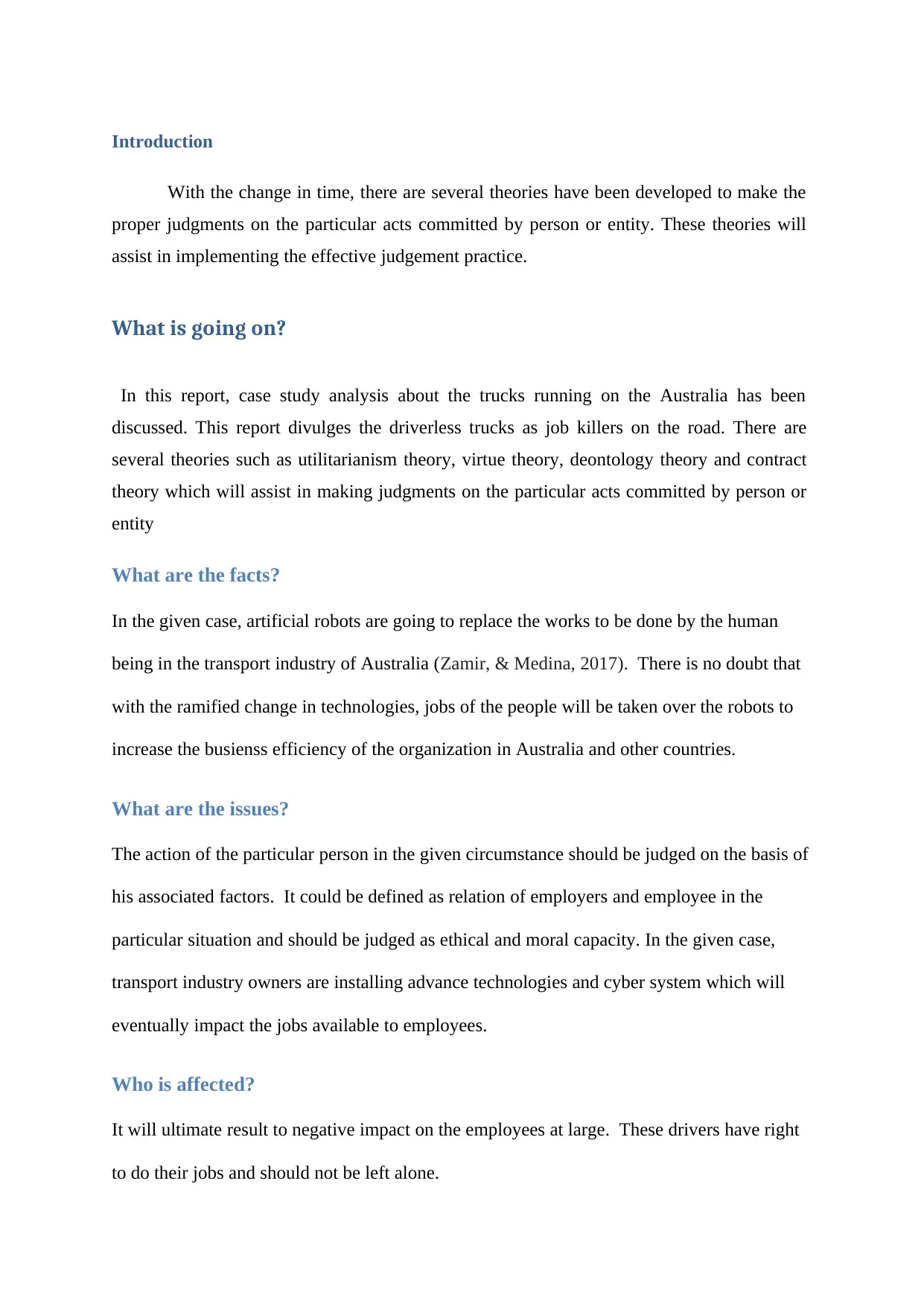
Introduction
With the change in time, there are several theories have been developed to make the
proper judgments on the particular acts committed by person or entity. These theories will
assist in implementing the effective judgement practice.
What is going on?
In this report, case study analysis about the trucks running on the Australia has been
discussed. This report divulges the driverless trucks as job killers on the road. There are
several theories such as utilitarianism theory, virtue theory, deontology theory and contract
theory which will assist in making judgments on the particular acts committed by person or
entity
What are the facts?
In the given case, artificial robots are going to replace the works to be done by the human
being in the transport industry of Australia (Zamir, & Medina, 2017). There is no doubt that
with the ramified change in technologies, jobs of the people will be taken over the robots to
increase the busienss efficiency of the organization in Australia and other countries.
What are the issues?
The action of the particular person in the given circumstance should be judged on the basis of
his associated factors. It could be defined as relation of employers and employee in the
particular situation and should be judged as ethical and moral capacity. In the given case,
transport industry owners are installing advance technologies and cyber system which will
eventually impact the jobs available to employees.
Who is affected?
It will ultimate result to negative impact on the employees at large. These drivers have right
to do their jobs and should not be left alone.
With the change in time, there are several theories have been developed to make the
proper judgments on the particular acts committed by person or entity. These theories will
assist in implementing the effective judgement practice.
What is going on?
In this report, case study analysis about the trucks running on the Australia has been
discussed. This report divulges the driverless trucks as job killers on the road. There are
several theories such as utilitarianism theory, virtue theory, deontology theory and contract
theory which will assist in making judgments on the particular acts committed by person or
entity
What are the facts?
In the given case, artificial robots are going to replace the works to be done by the human
being in the transport industry of Australia (Zamir, & Medina, 2017). There is no doubt that
with the ramified change in technologies, jobs of the people will be taken over the robots to
increase the busienss efficiency of the organization in Australia and other countries.
What are the issues?
The action of the particular person in the given circumstance should be judged on the basis of
his associated factors. It could be defined as relation of employers and employee in the
particular situation and should be judged as ethical and moral capacity. In the given case,
transport industry owners are installing advance technologies and cyber system which will
eventually impact the jobs available to employees.
Who is affected?
It will ultimate result to negative impact on the employees at large. These drivers have right
to do their jobs and should not be left alone.
⊘ This is a preview!⊘
Do you want full access?
Subscribe today to unlock all pages.

Trusted by 1+ million students worldwide
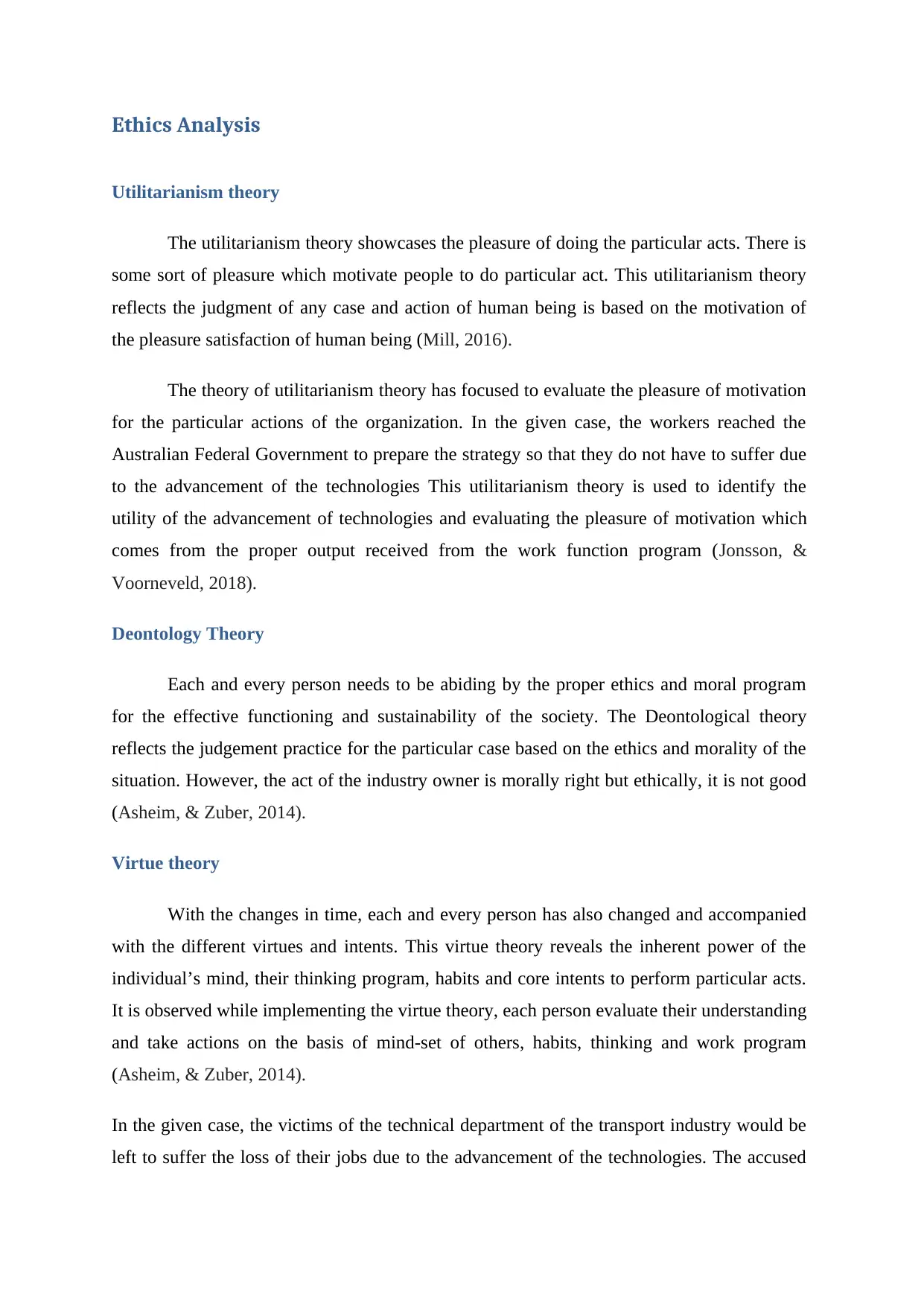
Ethics Analysis
Utilitarianism theory
The utilitarianism theory showcases the pleasure of doing the particular acts. There is
some sort of pleasure which motivate people to do particular act. This utilitarianism theory
reflects the judgment of any case and action of human being is based on the motivation of
the pleasure satisfaction of human being (Mill, 2016).
The theory of utilitarianism theory has focused to evaluate the pleasure of motivation
for the particular actions of the organization. In the given case, the workers reached the
Australian Federal Government to prepare the strategy so that they do not have to suffer due
to the advancement of the technologies This utilitarianism theory is used to identify the
utility of the advancement of technologies and evaluating the pleasure of motivation which
comes from the proper output received from the work function program (Jonsson, &
Voorneveld, 2018).
Deontology Theory
Each and every person needs to be abiding by the proper ethics and moral program
for the effective functioning and sustainability of the society. The Deontological theory
reflects the judgement practice for the particular case based on the ethics and morality of the
situation. However, the act of the industry owner is morally right but ethically, it is not good
(Asheim, & Zuber, 2014).
Virtue theory
With the changes in time, each and every person has also changed and accompanied
with the different virtues and intents. This virtue theory reveals the inherent power of the
individual’s mind, their thinking program, habits and core intents to perform particular acts.
It is observed while implementing the virtue theory, each person evaluate their understanding
and take actions on the basis of mind-set of others, habits, thinking and work program
(Asheim, & Zuber, 2014).
In the given case, the victims of the technical department of the transport industry would be
left to suffer the loss of their jobs due to the advancement of the technologies. The accused
Utilitarianism theory
The utilitarianism theory showcases the pleasure of doing the particular acts. There is
some sort of pleasure which motivate people to do particular act. This utilitarianism theory
reflects the judgment of any case and action of human being is based on the motivation of
the pleasure satisfaction of human being (Mill, 2016).
The theory of utilitarianism theory has focused to evaluate the pleasure of motivation
for the particular actions of the organization. In the given case, the workers reached the
Australian Federal Government to prepare the strategy so that they do not have to suffer due
to the advancement of the technologies This utilitarianism theory is used to identify the
utility of the advancement of technologies and evaluating the pleasure of motivation which
comes from the proper output received from the work function program (Jonsson, &
Voorneveld, 2018).
Deontology Theory
Each and every person needs to be abiding by the proper ethics and moral program
for the effective functioning and sustainability of the society. The Deontological theory
reflects the judgement practice for the particular case based on the ethics and morality of the
situation. However, the act of the industry owner is morally right but ethically, it is not good
(Asheim, & Zuber, 2014).
Virtue theory
With the changes in time, each and every person has also changed and accompanied
with the different virtues and intents. This virtue theory reveals the inherent power of the
individual’s mind, their thinking program, habits and core intents to perform particular acts.
It is observed while implementing the virtue theory, each person evaluate their understanding
and take actions on the basis of mind-set of others, habits, thinking and work program
(Asheim, & Zuber, 2014).
In the given case, the victims of the technical department of the transport industry would be
left to suffer the loss of their jobs due to the advancement of the technologies. The accused
Paraphrase This Document
Need a fresh take? Get an instant paraphrase of this document with our AI Paraphraser
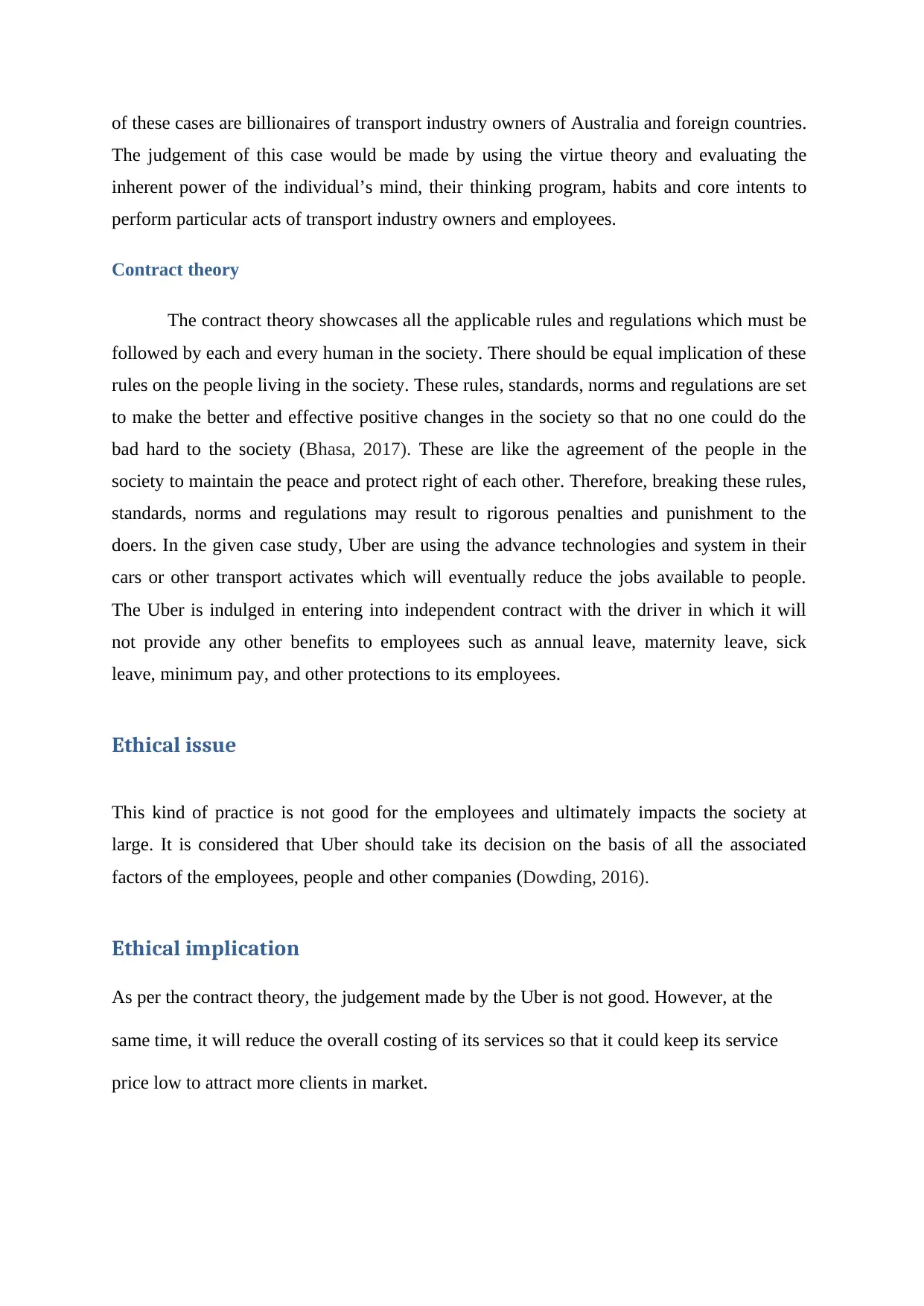
of these cases are billionaires of transport industry owners of Australia and foreign countries.
The judgement of this case would be made by using the virtue theory and evaluating the
inherent power of the individual’s mind, their thinking program, habits and core intents to
perform particular acts of transport industry owners and employees.
Contract theory
The contract theory showcases all the applicable rules and regulations which must be
followed by each and every human in the society. There should be equal implication of these
rules on the people living in the society. These rules, standards, norms and regulations are set
to make the better and effective positive changes in the society so that no one could do the
bad hard to the society (Bhasa, 2017). These are like the agreement of the people in the
society to maintain the peace and protect right of each other. Therefore, breaking these rules,
standards, norms and regulations may result to rigorous penalties and punishment to the
doers. In the given case study, Uber are using the advance technologies and system in their
cars or other transport activates which will eventually reduce the jobs available to people.
The Uber is indulged in entering into independent contract with the driver in which it will
not provide any other benefits to employees such as annual leave, maternity leave, sick
leave, minimum pay, and other protections to its employees.
Ethical issue
This kind of practice is not good for the employees and ultimately impacts the society at
large. It is considered that Uber should take its decision on the basis of all the associated
factors of the employees, people and other companies (Dowding, 2016).
Ethical implication
As per the contract theory, the judgement made by the Uber is not good. However, at the
same time, it will reduce the overall costing of its services so that it could keep its service
price low to attract more clients in market.
The judgement of this case would be made by using the virtue theory and evaluating the
inherent power of the individual’s mind, their thinking program, habits and core intents to
perform particular acts of transport industry owners and employees.
Contract theory
The contract theory showcases all the applicable rules and regulations which must be
followed by each and every human in the society. There should be equal implication of these
rules on the people living in the society. These rules, standards, norms and regulations are set
to make the better and effective positive changes in the society so that no one could do the
bad hard to the society (Bhasa, 2017). These are like the agreement of the people in the
society to maintain the peace and protect right of each other. Therefore, breaking these rules,
standards, norms and regulations may result to rigorous penalties and punishment to the
doers. In the given case study, Uber are using the advance technologies and system in their
cars or other transport activates which will eventually reduce the jobs available to people.
The Uber is indulged in entering into independent contract with the driver in which it will
not provide any other benefits to employees such as annual leave, maternity leave, sick
leave, minimum pay, and other protections to its employees.
Ethical issue
This kind of practice is not good for the employees and ultimately impacts the society at
large. It is considered that Uber should take its decision on the basis of all the associated
factors of the employees, people and other companies (Dowding, 2016).
Ethical implication
As per the contract theory, the judgement made by the Uber is not good. However, at the
same time, it will reduce the overall costing of its services so that it could keep its service
price low to attract more clients in market.
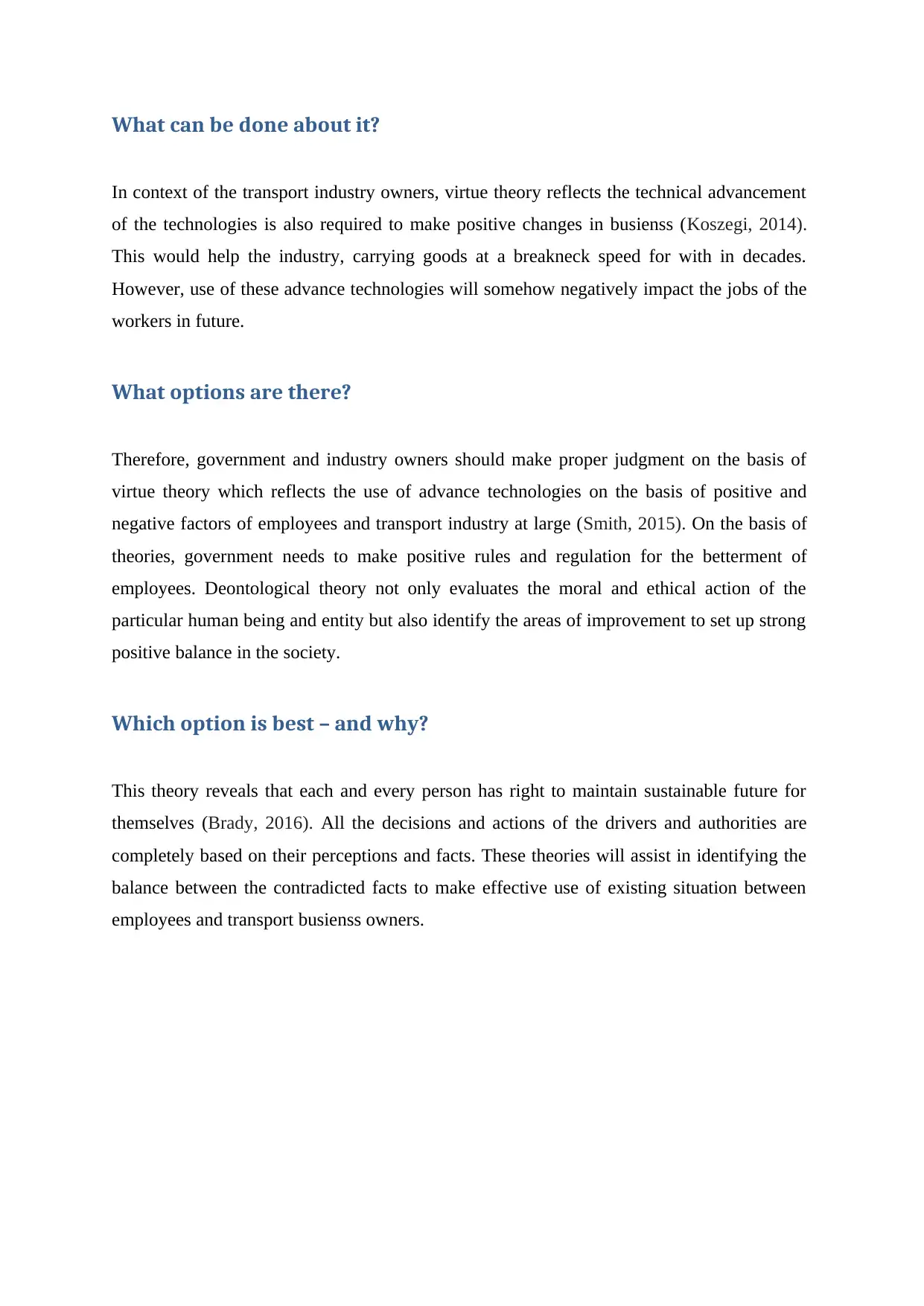
What can be done about it?
In context of the transport industry owners, virtue theory reflects the technical advancement
of the technologies is also required to make positive changes in busienss (Koszegi, 2014).
This would help the industry, carrying goods at a breakneck speed for with in decades.
However, use of these advance technologies will somehow negatively impact the jobs of the
workers in future.
What options are there?
Therefore, government and industry owners should make proper judgment on the basis of
virtue theory which reflects the use of advance technologies on the basis of positive and
negative factors of employees and transport industry at large (Smith, 2015). On the basis of
theories, government needs to make positive rules and regulation for the betterment of
employees. Deontological theory not only evaluates the moral and ethical action of the
particular human being and entity but also identify the areas of improvement to set up strong
positive balance in the society.
Which option is best – and why?
This theory reveals that each and every person has right to maintain sustainable future for
themselves (Brady, 2016). All the decisions and actions of the drivers and authorities are
completely based on their perceptions and facts. These theories will assist in identifying the
balance between the contradicted facts to make effective use of existing situation between
employees and transport busienss owners.
In context of the transport industry owners, virtue theory reflects the technical advancement
of the technologies is also required to make positive changes in busienss (Koszegi, 2014).
This would help the industry, carrying goods at a breakneck speed for with in decades.
However, use of these advance technologies will somehow negatively impact the jobs of the
workers in future.
What options are there?
Therefore, government and industry owners should make proper judgment on the basis of
virtue theory which reflects the use of advance technologies on the basis of positive and
negative factors of employees and transport industry at large (Smith, 2015). On the basis of
theories, government needs to make positive rules and regulation for the betterment of
employees. Deontological theory not only evaluates the moral and ethical action of the
particular human being and entity but also identify the areas of improvement to set up strong
positive balance in the society.
Which option is best – and why?
This theory reveals that each and every person has right to maintain sustainable future for
themselves (Brady, 2016). All the decisions and actions of the drivers and authorities are
completely based on their perceptions and facts. These theories will assist in identifying the
balance between the contradicted facts to make effective use of existing situation between
employees and transport busienss owners.
⊘ This is a preview!⊘
Do you want full access?
Subscribe today to unlock all pages.

Trusted by 1+ million students worldwide
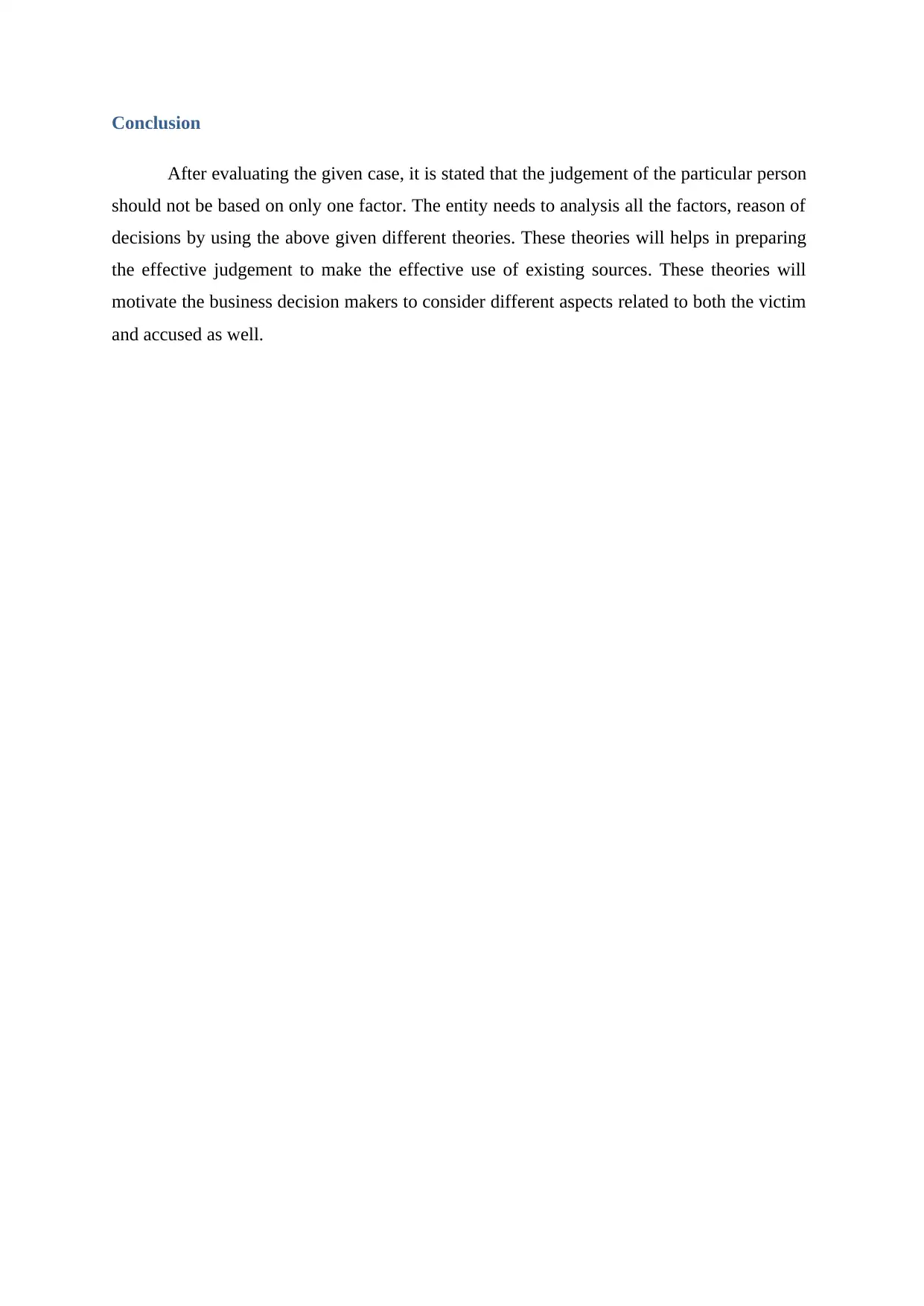
Conclusion
After evaluating the given case, it is stated that the judgement of the particular person
should not be based on only one factor. The entity needs to analysis all the factors, reason of
decisions by using the above given different theories. These theories will helps in preparing
the effective judgement to make the effective use of existing sources. These theories will
motivate the business decision makers to consider different aspects related to both the victim
and accused as well.
After evaluating the given case, it is stated that the judgement of the particular person
should not be based on only one factor. The entity needs to analysis all the factors, reason of
decisions by using the above given different theories. These theories will helps in preparing
the effective judgement to make the effective use of existing sources. These theories will
motivate the business decision makers to consider different aspects related to both the victim
and accused as well.
Paraphrase This Document
Need a fresh take? Get an instant paraphrase of this document with our AI Paraphraser
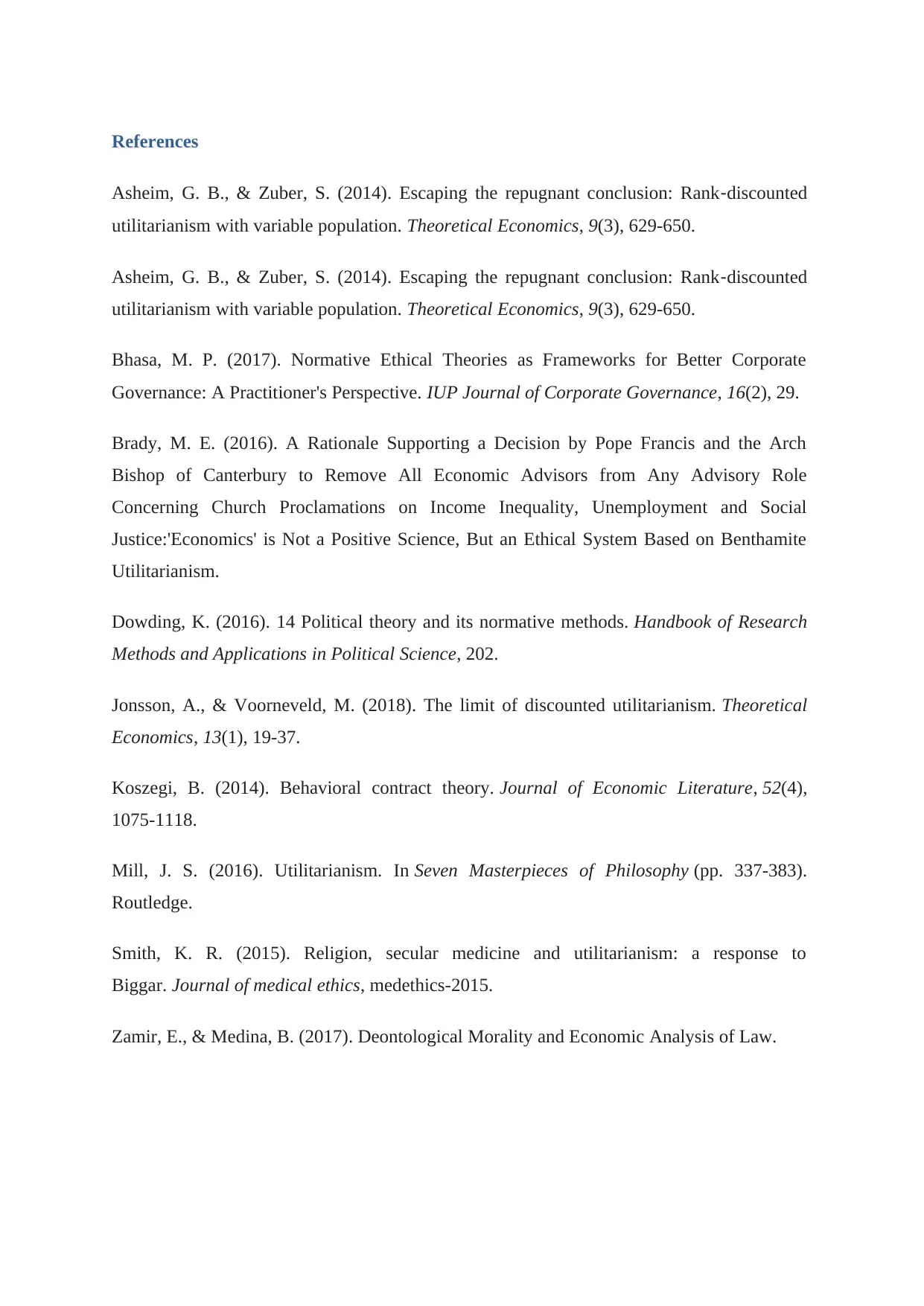
References
Asheim, G. B., & Zuber, S. (2014). Escaping the repugnant conclusion: Rank‐discounted
utilitarianism with variable population. Theoretical Economics, 9(3), 629-650.
Asheim, G. B., & Zuber, S. (2014). Escaping the repugnant conclusion: Rank‐discounted
utilitarianism with variable population. Theoretical Economics, 9(3), 629-650.
Bhasa, M. P. (2017). Normative Ethical Theories as Frameworks for Better Corporate
Governance: A Practitioner's Perspective. IUP Journal of Corporate Governance, 16(2), 29.
Brady, M. E. (2016). A Rationale Supporting a Decision by Pope Francis and the Arch
Bishop of Canterbury to Remove All Economic Advisors from Any Advisory Role
Concerning Church Proclamations on Income Inequality, Unemployment and Social
Justice:'Economics' is Not a Positive Science, But an Ethical System Based on Benthamite
Utilitarianism.
Dowding, K. (2016). 14 Political theory and its normative methods. Handbook of Research
Methods and Applications in Political Science, 202.
Jonsson, A., & Voorneveld, M. (2018). The limit of discounted utilitarianism. Theoretical
Economics, 13(1), 19-37.
Koszegi, B. (2014). Behavioral contract theory. Journal of Economic Literature, 52(4),
1075-1118.
Mill, J. S. (2016). Utilitarianism. In Seven Masterpieces of Philosophy (pp. 337-383).
Routledge.
Smith, K. R. (2015). Religion, secular medicine and utilitarianism: a response to
Biggar. Journal of medical ethics, medethics-2015.
Zamir, E., & Medina, B. (2017). Deontological Morality and Economic Analysis of Law.
Asheim, G. B., & Zuber, S. (2014). Escaping the repugnant conclusion: Rank‐discounted
utilitarianism with variable population. Theoretical Economics, 9(3), 629-650.
Asheim, G. B., & Zuber, S. (2014). Escaping the repugnant conclusion: Rank‐discounted
utilitarianism with variable population. Theoretical Economics, 9(3), 629-650.
Bhasa, M. P. (2017). Normative Ethical Theories as Frameworks for Better Corporate
Governance: A Practitioner's Perspective. IUP Journal of Corporate Governance, 16(2), 29.
Brady, M. E. (2016). A Rationale Supporting a Decision by Pope Francis and the Arch
Bishop of Canterbury to Remove All Economic Advisors from Any Advisory Role
Concerning Church Proclamations on Income Inequality, Unemployment and Social
Justice:'Economics' is Not a Positive Science, But an Ethical System Based on Benthamite
Utilitarianism.
Dowding, K. (2016). 14 Political theory and its normative methods. Handbook of Research
Methods and Applications in Political Science, 202.
Jonsson, A., & Voorneveld, M. (2018). The limit of discounted utilitarianism. Theoretical
Economics, 13(1), 19-37.
Koszegi, B. (2014). Behavioral contract theory. Journal of Economic Literature, 52(4),
1075-1118.
Mill, J. S. (2016). Utilitarianism. In Seven Masterpieces of Philosophy (pp. 337-383).
Routledge.
Smith, K. R. (2015). Religion, secular medicine and utilitarianism: a response to
Biggar. Journal of medical ethics, medethics-2015.
Zamir, E., & Medina, B. (2017). Deontological Morality and Economic Analysis of Law.
1 out of 8
Related Documents
Your All-in-One AI-Powered Toolkit for Academic Success.
+13062052269
info@desklib.com
Available 24*7 on WhatsApp / Email
![[object Object]](/_next/static/media/star-bottom.7253800d.svg)
Unlock your academic potential
Copyright © 2020–2026 A2Z Services. All Rights Reserved. Developed and managed by ZUCOL.





